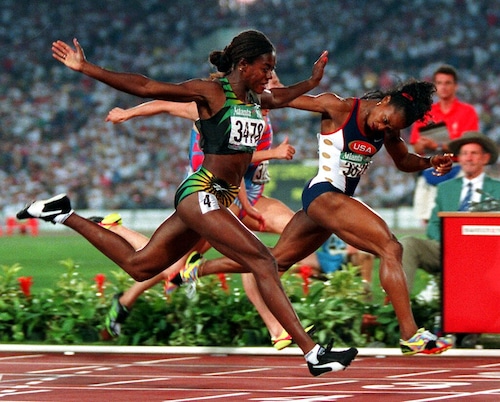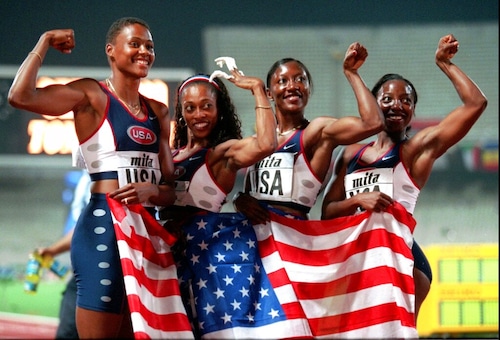She was considered one of the fastest women in the world. But, suddenly, Gail Devers was stopped in her tracks by her own body.
“I was, as I say, on top of my game, headed to my first Olympic Games in Seoul, Korea, and then basically, the bottom fell out,” Devers told MassLive recently. “I went from running my personal best. I was an American record holder in the 100-meter hurdles. Then I went to the games and I ran slower than I’d ever run in my life.”
Devers said she was tired but couldn’t sleep. Her hair was falling out, her face was discolored, her skin was scaly, her eyes were bulging, red, dry and hurt. She lost 40 pounds in a couple of months.
“Even when I did sleep, my eyes wouldn’t close all the way,” she recalled.
For about two and a half years, doctors would tell her everything from “there’s nothing wrong” to “you’re too stressed” to “you’re crazy.”
But she knew something was wrong and she kept pushing back.
“I was so desperate for answers, and I just wanted to get back to being the old Gail,” she said.
Finally, she was diagnosed with Graves’ disease. Still, it’d take her 30 years before she’d find the answers to her eye problems, also being diagnosed with thyroid eye disease, or TED.

Gail Devers runs to victory in her heat in the quarterfinals of the women’s 100-meter sprint during the Olympic track trials in Atlanta, Friday, June 14, 1996. Devers, an Olympic gold medalist, has come-off nearly two years recovering from various injuries. (AP Photo/Eric Risberg)ASSOCIATED PRESS
Women’s health
Devers told her story to more than 11,000 people, mostly women, at the Massachusetts Conference for Women held last week at the Boston Convention and Exhibition Center.
Devers; Oprah Winfrey; Oprah’s best friend and co-host of “CBS Mornings,” Gayle King; Massachusetts Gov. Maura Healey; Cailtlin Clark and Beverly Johnson were all keynote speakers during the 20th anniversary of the event on Dec. 12.
The theme was Power in Unity. Keynote speakers talked about relationship building in the workplace, what it means to be a team and how their failures led to where they are today.
There were also many sessions from other women leaders in Massachusetts, including topics on work-life balance, supporting caregivers in the workplace, and effectively managing hybrid teams.
Women being listened to in healthcare was a problem when Devers first started experiencing symptoms in 1988 and continues to be a problem now, she said.
“It’s no accident that the word ‘hysteria’ originates from the Greek word for ‘uterus.’ There’s still this pervasive belief in the medical community that anytime a woman complains about her health, it’s either related to her hormones or all in her head,” OB/GYN Stephanie Trentacoste McNally said in a Q&A with Katz Institute for Women’s Health.
Women who visited emergency departments with chest pain waited 29% longer than men to be evaluated for possible heart attacks, according to a 2022 study by the Journal of the American Heart Association.
A study from 2004 found that women who went to the ER with severe stomach pain had to wait about 33% longer than men with the same symptoms and were 25% less likely than men to be treated with powerful opioid painkillers.
And another study showed that middle-aged women with chest pain were twice as likely than men to be diagnosed with a mental illness.

Gail Devers of the United States, right, and Merlene Ottey of Jamaica cross the finish line in the women’s 100 meter final at the 1996 Summer Olympics in Atlanta, Saturday, July 27, 1996. Devers won the gold and Ottey won the silver. (AP Photo/Michael Probst)AP
Finding answers
Without answers, Devers closed herself up in her house and covered all her mirrors.
“I stopped looking at myself in the mirror, because the reflection looking back at me was not me,” she said.
But there was still something inside her that wanted to push out of the darkness.
“Every day, I would visualize myself getting back to the Olympic Games … I’d still visualized myself going back to the Olympic Games, running my race. I actually saw myself running my race,” she said.
That’s what pushed her to keep looking for the right doctor. And, eventually, she did.
“And so with that, that was like, ‘Oh, gosh, finally. I’m not crazy,‘” she said.
- Read more: Why hasn’t Oprah written a memoir?
She started back on her Olympic journey by getting on a stationary bike on the track, still unable to fully run.
When she finally did return to competition, they put her in lane two.
“They put me in lane two, which I say, was code for, ‘We don’t think you have a shot, but welcome to the games,‘” she joked.
But she didn’t let that get her down. She just focused on what she could do.
“So less than 11 seconds later, I won my first gold medal,” she said.
Devers went on to become a three-time Olympic gold medalist and 13-time world indoor and outdoor medalist. At the age of 40, Devers won the 60m hurdles at the Millrose Games in 7.86 seconds, which was the fastest time in the world for that year. She still holds the American record for 60m hurdles at 7.06, which she set on March 9, 1997 and the 100m hurdles at 12.33, which she set on July 23, 2000.

The gold medal winning United States Women’s 4×100 meters relay team, from left: Marion Jones, Gail Devers, Chryste Gaines and Inger Miller, pose for photogrphers as they hold the American national flag during their lap of honour after winning the final in a time of 41.47 seconds, at the World Track and Field Championships in Athens Saturday August 9, 1997. (AP Photo/Doug Mills)ASSOCIATED PRESS
Encouraging other women
Now, Devers encourages other women to keep pushing and to find answers.
She said her doctors know to schedule time to have real conversations, get tests as needed and be referred to specialists.
If the doctor isn’t listening, find a different one, she said.
“Sometimes women feel guilty about getting a second opinion, as if they’re betraying their current doctor. But it’s not like cheating on your spouse,” said Bella R. Grossman in the a Q&A with Katz Institute for Women’s Health. “You deserve to find a doctor that you can trust — one who genuinely listens to your concerns and delivers the best care possible.”
Devers also said women need to make sure they’re going to their yearly checkups to make sure they have a baseline understanding of their health and to talk about what has changed over the year.
And listen to other people’s stories.
Devers hopes that by talking about her symptoms with Graves’ disease and TED that other people can realize they have it, too.
“Everybody’s on their own journeys, whether it’s health or otherwise, we’re all running in our own lanes, but we are all teammates. And what does that mean? That means we’re supposed to look out for one another. We’re supposed to support one another,” she said.
She said she felt like she got to the finish line with her Graves’ disease diagnosis but something was holding her back from crossing the finish line. That changed with learning about TED.
“I took that long route. And I don’t, I seriously don’t want anyone to ever have to go through that … and I’m asking everybody else to grab the megaphone and help me get this message to everyone so that they can get their lives back on track,” Devers said.





